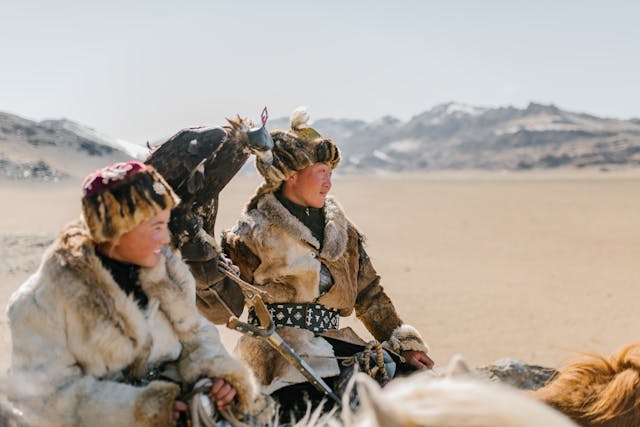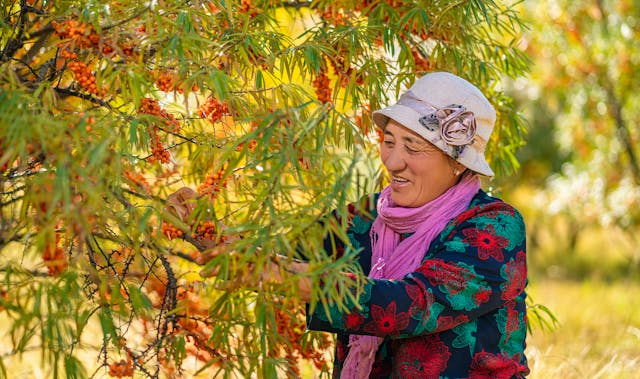50 Mongolian Words and Phrases for Beginners
Looking for a new language that’s totally different from anything you’ve learned before? Mongolian is a great choice. It sounds unique, looks different, and opens the door to a completely new part of the world.
Here’s what makes Mongolian stand out:
- Spoken in Mongolia and Inner Mongolia (China)
- More than 5 million speakers worldwide
- The official language of Mongolia
- Written in Cyrillic in Mongolia, and in a traditional vertical script in parts of China
- Part of the Mongolic language family—not related to Chinese or Russian
Whether you’re travelling, meeting new people, or just exploring something new, learning a few Mongolian words and phrases is a fun and rewarding place to start.
→Sign Up Now: Free Trial Mongolian Lesson With a Native Teacher!←
In this article, you will learn 50 essential Mongolian words and phrases to help you greet people, be polite, and handle everyday situations with confidence.

What Are the Most Common Mongolian Greetings?
Learning greetings is one of the best ways to start using Mongolian phrases in real life. These Mongolian words help you show respect, start conversations, and make a positive impression with locals.
1. Sain bainaa – Сайн байна – Hello
2. Sain uu? – Сайн уу? – Hi (informal)
3. Öglöönii mend – Өглөөний мэнд – Good morning
4. Shöniin mend – Шөнийн мэнд – Good night
5. Tanyg sain bain uu? – Таныг сайн байна уу? – How are you?
6. Bi sain, bayarlalaa – Би сайн, баярлалаа – I’m fine, thank you
What Are Some Basic Mongolian Words for Everyday Use?
These simple Mongolian words appear in almost every conversation. Whether you’re shopping, asking directions, or thanking someone, these are must-know Mongolian phrases. Learning to use them in context helps you sound respectful even with a beginner’s vocabulary.
7. Tiëm – Тийм – Yes
8. Ügüi – Үгүй – No
9. Güiye – Гүйе – Please
10. Bayarlalaa – Баярлалаа – Thank you
11. Za, zugeer – За, зүгээр – You’re welcome
12. Uuchlaarai – Уучлаарай – Excuse me / Sorry
13. Za – За – OK / Alright
14. Bi oilgokhgüi – Би ойлгохгүй – I don’t understand
What Are Some Key Mongolian Phrases to Get By?
In this section, you’ll find essential Mongolian phrases grouped into three everyday situations: shopping, eating out, and emergencies.
Whether you’re browsing a market, ordering lunch, or trying to find your way in a new city, these practical Mongolian words and phrases will help you stay confident and understood.
Mongolian Phrases for Shopping
15. Yamar une ve? – Ямар үнэ вэ? – How much is it?
16. Khymdruulakh uu? – Хямдруулах уу? – Can you lower the price?
17. Bi ene-g avya – Би энийг авъя – I’ll take this
18. Ta busad zagvartai yu? – Та бусад загвартай юу? – Do you have other styles?
19. Naad khariu ni buruu – Наад хариу нь буруу – That’s the wrong change
Mongolian Phrases for Eating Out
20. Tsés baina uu? – Цэс байна уу? – Do you have a menu?
21. Bi tsagaan mah iddeggüi – Би цагаан мах иддэггүй – I don’t eat meat
22. Khool amttai baina – Хоол амттай байна – The food is delicious
23. Nogoo khool baina uu? – Ногоо хоол байна уу? – Do you have vegetarian food?
24. Sav khiij uguuch – Сав хийж өгөөч – Can I have it to go?
Mongolian Phrases for Emergencies
25. Uuchlaarai, bi tosgoolgui baina – Уучлаарай, би төөрсөн байна – Sorry, I’m lost
26. Emiin san khаana ve? – Эмийн сан хаана вэ? – Where is the pharmacy?
27. Ulaan zagvar medeh uu? – Улаан загвар мэдэх үү? – Do you know the red route?
28. Minii utas alga bolson – Миний утас алга болсон – My phone is missing
29. Emnelegt yavakh kheregtei baina – Эмнэлэгт явах хэрэгтэй байна – I need to go to the hospital
What Are the Most Useful Mongolian Words for Family?
Talking about your family is one of the most personal and common ways to connect with others. These Mongolian words will help you describe your relatives and understand when locals mention theirs.
30. Aav – Аав – Father
31. Eej – Ээж – Mother
32. Akhaa – Ахаа – Older brother
33. Egee – Эгц – Older sister
34. Duug – Дүүг – Younger sibling
35. Khani – Хань – Spouse / Partner
36. Ur khüükhdüü – Үр хүүхдүүд – Children
What Mongolian Words and Phrases Are Useful for Talking About Accommodation?
Whether you’re checking into a hotel or asking about a place to stay, these Mongolian words and phrases will make the process smoother and more comfortable.
37. Buudal khaana ve? – Буудал хаана вэ? – Where is the hotel?
38. Khaalga neekhüü – Хаалга нээх үү – Could you open the door?
39. Bi uruunii tolgolt khiie – Би өрөөний төлбөр хийе – I’d like to pay for the room
40. Dotor ni unitaz baina uu? – Дотор нь унитаз байна уу? – Does it have a toilet inside?
41. Shower-tai yu? – Шауртай юу? – Does it have a shower?
42. Bi neg shönökhon baina – Би нэг шөнө хонож байна – I’m staying for one night
43. Onoodor khool orson uu? – Өнөөдөр хоол орсон уу? – Is breakfast included today?

What Are Some Common Mongolian Sayings?
Mongolian proverbs and idioms reflect values like independence, perseverance, and a quiet strength. Mongolian sayings are still used in everyday life and offer insight into how Mongolians think and communicate.
44. Süüliin temeeni acha khünd – Сүүлийн тэмээний ачаа хүнд – The last camel gets the heavy load. (Used to express that those who arrive last get whatever’s left—whether that’s a burden or a hidden reward.)
45. Muu khünii duu changa – Муу хүний дуу чанга – A bad person’s voice is loud
(Mongolians value quiet speech. Loudness is seen as a sign of immaturity or bad character.)
46. Khünii erkhend jargakhaar, ööriin erkhend zov – Хүний эрхэнд жаргахаар, өөрийн эрхэнд зов – Better to suffer under your own rule than live well under someone else’s
(A classic Mongolian saying about the value of self-reliance and independence.)
What Are the Most Common Mongolian Curse Words?
Mongolian curse words are often colorful, sharp, and grounded in animal comparisons. While swearing isn’t used as casually as in English, when Mongolians do curse, the words are blunt and direct.
47. Pizda – Пизда – Equivalent to F-word; very strong and used mostly among close friends or in anger.
48. Haraal id – Хараал ид – Literally “may you be cursed”; similar to “damn you”
49. Mal – Мал – Idiot; literally means “livestock”
50. Huts – Хуц – Shut your mouth (lit. “bark!”)
Note: Mongolian curse words are serious insults and not used lightly. Some, like mal, are more common in teasing or frustration, while others (like pizda) are highly offensive and should be avoided unless you are an advanced learner who fully understands the context.
If you’re interested in learning Mongolian the right way—with cultural insight and real-life communication in mind—Language Trainers offers personalized one-to-one lessons tailored to your goals and interests. Whether you want to focus on travel vocabulary, everyday conversations, or understanding Mongolian media, our expert teachers adapt each lesson to suit your level and needs. You can choose in-person Mongolian courses in New York and other major cities, or go for Mongolian online classes from anywhere in the world. Ready to take your first step? Get started today with Language Trainers.
FAQ – Learn More about the Mongolian Language
Before you leave us, make sure to check out the most frequently asked questions about the Mongolian language. Whether you’re just curious or seriously thinking about learning, these quick answers will give you a head start.
1. Is the Mongolian language still spoken?
Yes, the Mongolian language is still actively spoken today. It is the official language of Mongolia and is used by more than 5 million speakers worldwide, including communities in Inner Mongolia (China) and other parts of Central Asia.
2. Is Mongolian language difficult to learn?
Yes, Mongolian is considered one of the more difficult languages for English speakers to learn. According to the Foreign Service Institute (FSI), Mongolian falls into Category IV, meaning it typically requires around 1,100 hours of study to reach professional working proficiency. This puts it in the same category as Turkish, Vietnamese, and Hungarian, and just below the hardest Category V languages like Arabic, Japanese, and Chinese.
→Sign Up Now: Free Trial Mongolian Lesson With a Native Teacher!←
Despite the challenges, learners who work with native-speaking tutors and follow a personalized lesson plan based on their interests and learning style often see faster progress. One-to-one Mongolian lessons with Language Trainers are a great way to break through the initial barriers and start using the language confidently.
3. What language is Mongolian closest to?
Mongolian is most closely related to other languages in the Mongolic family, such as Buryat and Kalmyk. It is not closely related to Turkic or Slavic languages, though it has borrowed vocabulary from Russian and Chinese over time.
4. Is Mongolian language similar to Chinese?
No, Mongolian and Chinese are completely different languages. They belong to different language families and have distinct phonetics, grammar, and writing systems. While both are spoken in China (in different regions), they are not mutually intelligible.
5. What alphabet does Mongolian use?
In Mongolia, the language is written using the Cyrillic alphabet, introduced during the Soviet era. In Inner Mongolia (China), the traditional vertical Mongolian script is still in use. Both writing systems serve different regions but represent the same spoken language.
